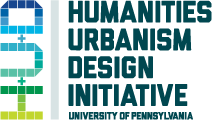Spring 2022
Each year the H+U+D initiative sponsors (1) an undergraduate Gateway Course that introduces the multidisciplinary study of cities, (2) two undergraduate City Seminars, one devoted to a North American city and the other to a city overseas, which examine the city in a detailed, multidisciplinary way, (3) a mixed undergraduate/graduate Anchor Institution Seminar, which examines the activities of one of the Philadelphia institutions that reflects and serves the city’s diverse population, and (4) a graduate Problematics Seminar, co-taught by Design and SAS humanities faculty, on a topic that grows out of the collaborative work of the H+U+D Colloquium.
